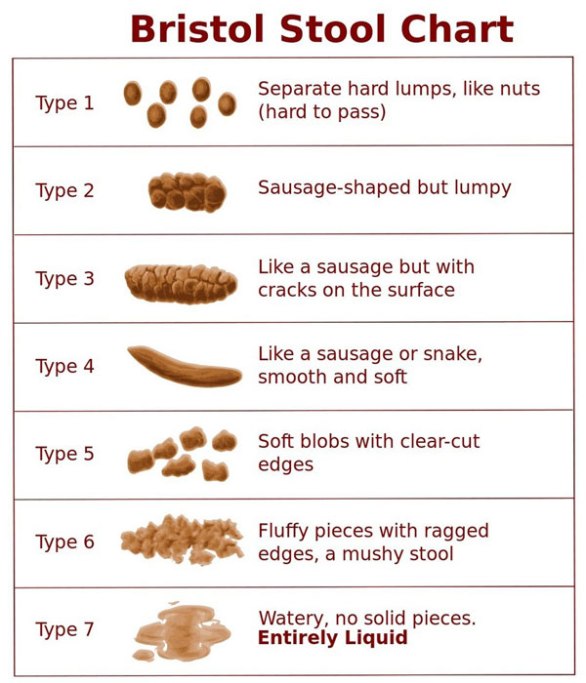
Constipation, or difficulty emptying the bowels, is a widespread problem for many people. In fact, according to the National Institutes of Health, 63 million people were affected by chronic constipation in the year 2000.[1] There are many causes for chronic constipation, including blockages in the colon and rectum, neurological or muscular problems affecting elimination, hormone imbalances, dehydration, or improper diet.
At Clear Skies Acupuncture and Herbal Medicine, we work with patients who have constipation and diarrhea. Acupuncture and Chinese herbal medicine can help resolve issues of constipation, diarrhea, and other gastrointestinal problems, including bloating, acid reflux, irritable bowel syndrome (IBS), and pain. Below is a guide with some simple tips to help you understand your own digestion better, and help you resolve constipation:
So How Much Should I Poop?
Many sources will say you should poop at least three times a week. A good general rule is that you should be pooping anywhere from once every other day to twice a day. More than twice a day, you are tending towards diarrhea, less than once every two days and you may be constipated.
Let’s learn more about poop! It’s best to have poops that are easy and comfortable to pass, without a lot of straining. You should feel like you’ve had a complete bowel movement, like it is finished. Ideally, poop should be medium brown and solid in consistency, but not hard or lumpy. In fact, a common tool called the Bristol Stool Chart (see image above), can help show you if your poops are healthy. On the chart, Type 4 poop is optimal, and Type 3 is also good. If you’re having poop that is consistently Type 1 or 2, you may tend towards constipation, with Type 5-7 you may tend towards diarrhea.
How Can I Poop More?
Constipation can often be resolved or aided with simple dietary and lifestyle changes. Here are a few suggestions:
- Try Chinese herbal medicine. From a Chinese medical perspective, constipation can have a number of common causes. For instance, one pattern may include physical dryness and deficiency of fluids and blood, which herbs such as Dang Gui (Angelica) and Sang Shen (Mulberry) can help resolve. Another pattern may include a buildup of heat and stagnant qi. In this case, Chinese herbalists might use Da Huang (Rhubarb root and rhizome) to help purge the intestine. Please consult a Chinese herbalist for a proper diagnosis and prescription for your condition.
- Eat fiber. National dietary guidelines suggest that women should eat 25 grams of fiber a day between ages 18 and 50, and 21 grams a day when over 50, while men should have 30 to 38 grams a day. Fiber helps make poop loose and bulky, and as a bonus, it can also help lower cholesterol. Foods high in fiber include split peas, lentils, beans, oatmeal, broccoli, blackberries, prunes, figs, peas, artichokes, greens, brussel sprouts, and bran.
- Add seeds to your meals. Adding flax, hemp, or chia seeds to your meals can help your digestion. Flax, chia, and hemp seeds are also rich in omega-3 fatty acids, which are good for the heart. Hemp seeds, or Huo Ma Ren, are a Chinese herb often used to moisten the intestine to help the passage of stool, while nourishing the body’s yin and blood. Try mixing seeds into your morning oatmeal, a veggie stir-fry, smoothie, or salad.
- Drink water. When you’re dehydrated, you’re more likely to be constipated, because your body is trying to retain water. A common health recommendation is to drink 8 glasses of water a day, which is about two liters in total. However, you need more water in hot temperatures, if you’re exercising and sweating a lot, or if you’re drinking dehydrating beverages, like coffee, tea, or alcohol.
Having trouble drinking water? Try carrying a water bottle with you, and keeping it at your desk, set a daily reminder on your phone, or use a free app (such as Waterlogged, Hydro Coach, or Daily Water) to remind you. Sweating a lot? Add some electrolytes to your water, or try a coconut water.
- Exercise. Exercise helps food move through your colon more efficiently, even causing contraction of intestinal muscles. Moreover, exercise reduces stress, or from a Chinese medicine perspective helps to regulate the Liver qi, which can also be a cause of constipation.
- Abdominal massage. Abdominal massage can help relieve constipation. Try massaging your abdomen in a clockwise direction, using circular movements around the belly button, and following the natural flow of the large intestine. Rubbing a little castor oil on the belly during the massage can also be useful. We often use abdominal massage in Chinese medical treatments, sometimes with castor oil or heat packs.
- Try acupuncture. Acupuncture can help support and strengthen the digestion, increase activity in the intestines, relieve stress, and bring the body into balance. Contact us now for an appointment.
It shouldn’t be hard to poop! If you’re having trouble, please let us help you out. Book now.
[1]National Institutes of Diabetes and Digestive and Kidney Diseases, National Institutes of Health (online). “Digestive Diseases Statistics for the United States”, Retrieved on March 7, 2018 from: https://www.niddk.nih.gov/health-information/health-statistics/digestive-diseases